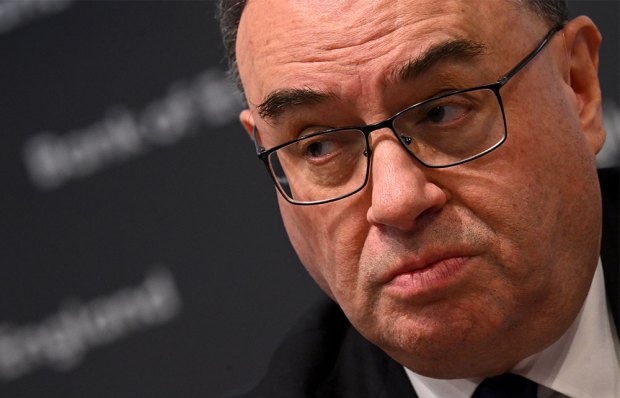Anecdotes and statistics should never be confused, but let’s do just that to build a composite picture of today’s UK economy. As the ‘cost of living crisis’ – barely out of its starting blocks – began to eat spending power and erode confidence, high street sales fell 1.4 per cent in March while non-store retail (largely online) dropped 7.9 per cent. Office occupancy, blighted by working from home, is stuck below 30 per cent of capacity. The City of London is a ghost town on Mondays and Fridays, while West End footfall remains a fifth below 2019 levels. But in case you’re planning a resumed commute or an in-town shopping binge any time soon, be aware that rail workers are threatening ‘the biggest rail strike in modern history’. In the unlikely case that you’re launching a new export venture to Europe, don’t even think of booking a P&O ferry. And if you’ve run short of cooking oil, remember it’s rationed in all major supermarkets.
At the same time, one in 17 of us has Covid, causing disruption everywhere – but especially in leisure and hospitality. Short-staffed restaurants are plagued by customer no-shows. My own latest theatrical effort – since you ask, I was to play Denis Thatcher, Ronald Reagan, Gerry Adams and Arthur Scargill in Moira Buffini’s Handbagged –is postponed after both leading ladies tested positive. American friends cancelled a London theatre-and-dining trip for fear of quarantine before they could go home.
Multiply this jumble of stats and stories by any big number you choose and you have a sense of how physical shortages, crippled logistics, war jitters and the debilitating effects of the lingering virus are combining with weak signals from Downing Street and the Bank of England to pour grit into the cogs of economic recovery. Yes, the IMF still expects UK growth of 3.7 per cent this year and 1.2 per cent in 2023. And yes, I hate to be the gloomiest pundit in the saloon bar. But the words rattling round my head are those of President George W. Bush as the financial crisis intensified in September 2008: ‘This sucker could go down.’
Too many streamers
So Elon Musk ignored my advice, as billionaires often do. Instead of staying usefully focused on building Tesla cars, he has pressed home his bid for Twitter, whose content he aims to free from its chains for the greater good of civilisation. We’ll wait and see how that goes. But meanwhile let’s not give his monster ego more airtime: at least as significant for most digital consumers – for whom news, opinion and entertainment are nowadays deeply confused – is the fate of Netflix, the California-based streaming service that slayed the terrestrial-TV dinosaur and surfed the lockdown wave, but whose shares have plunged by two-thirds from an insanely overvalued peak last autumn.
Netflix is rapidly becoming a business-school case study of the fate of pioneers when the markets they create become overcrowded. Too many streamers to choose from, too little original content worth watching – Anatomy of a Scandal was meretricious trash, wasn’t it? – plus rising pressure on household budgets: bingo, two million Netflix subscribers expected to cancel this quarter. That’s out of a global total of 222 million, but the downtrend after ten years’ growth is a warning to every player jostling for market share, perhaps even to Twitter, that the lifespan of digital conquerors can be cruelly short. In the shorter term it spells more trouble for Netflix – and the only help I can offer is to promise I’ll keep paying £6.99 a month if the company promises to scrap its $150 million deal with Harry and Meghan.
Into the wilderness
Nothing could be further from the froth and tumult of the tech-stock arena than the prospect of investing in Scotland’s northern wilderness. And if you did so a while ago, or had the good fortune to inherit a wee plot, you’ll be raising two fingers towards California with the news that last year, prices of Highland sporting estates jumped by 88 per cent and of hill farms by 60 per cent.
Why so? The answer is that eco-conscious incomers are buying all available acreage for reforestation, rewilding and peatland restoration – but usually not for traditional deer-stalking and grouse-shooting. Leaders of the trend include Danish retail billionaire Anders Holch Povlsen, who holds 220,000 acres of Sutherland and Inverness-shire, and Brewdog, which is reforesting a stretch of the Cairngorms in support of its claim to be the world’s first carbon-negative beer business.
All very worthy, you might think, except that it runs directly against the left-leaning land reforms Nicola Sturgeon’s SNP, now in coalition with the Greens, would prefer. Community ownership projects for local folk are priced out of the market while forestry subsidies largely go to absentees and the rich get richer as land values rise. As ever, saving the planet is a complicated matter.
Boardroom dames
This column has long argued for the promotion of more women to top corporate jobs, especially in banking, on the grounds that history suggests they’re less prone to delusional risk-taking than men – and many talented businesswomen of my acquaintance still feel the odds are stacked against them. But I’m sorry to see that in response to a Financial Conduct Authority consultation, 438 out of 439 companies objected to the regulator’s plan to count ‘those self-identifying as women’ when measuring diversity in the boardrooms and executive suites of UK listed companies.
New rules set a 40-per-cent-female target – still a stretch for half the FTSE 100 – but the binning of the plan to include self-identifiers in that quota probably scotches my last chance to slip into one of my glorious pantomime dame costumes and blag the seat at the Barclays board table that I’ve always felt was my destiny. Hey-ho. In the meantime, I’d love to know which was the one cringingly woke company out of 439 that actually favoured the FCA’s proposal.
Got something to add? Join the discussion and comment below.
Get 10 issues for just $10
Subscribe to The Spectator Australia today for the next 10 magazine issues, plus full online access, for just $10.
You might disagree with half of it, but you’ll enjoy reading all of it. Try your first month for free, then just $2 a week for the remainder of your first year.















Comments
Don't miss out
Join the conversation with other Spectator Australia readers. Subscribe to leave a comment.
SUBSCRIBEAlready a subscriber? Log in